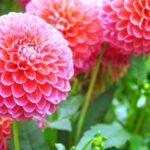
Summer, the Heart and the Fire Element
The internal organs are much more than physical structures in the TCM view. They are complex systems also involving aspects of the mind, emotions and spirit. In addition to its physiological function, each organ functions at the invisible level of vital energy, or Qi. Each organ is uniquely related to a body tissue, a sense organ, emotion, taste, sound, climate, and a direction, among a seemingly endless range of correspondences. These qualities are organized in the Theory of Five Elements, an ancient system integral to TCM theory, which provides TCM practitioners with a framework to understand, diagnose and treat health problems.
Summer, with its blazing hot sun, is related to the Fire element. The Heart and Small Intestine organ system is predominant during Summer, so its energy is now at its peak. The Heart performs many energy functions that are vital to the health of your entire body, mind and spirit. On a very deep level, it just isn’t possible to have true health without a peaceful Heart.
Housing the Spirit or Shen
In TCM, your physical heart is the Heart of your being. It coordinates all activity—physical, mental, emotional and spiritual—in the body. The Heart houses your spirit or Shen as well the “control center” for the other four aspects of the soul, each one residing in the other organ systems. These are the Yi, the aspect of the soul linked to thought and the Spleen; the Po, the physical aspect of the soul, related to the Lung; the Zhi, the soul aspect related to willpower and the Kidney; and the Hun, the Ethereal Soul, or mental-spiritual soul aspect, related to the Liver.
While your body and its organs need Qi to power their functions, they also need the right “message.” The great task of the Heart is to provide this message. TCM sees everything in terms of relationships. You must have enough Qi and all your organs must work well individually in order to have good health. Yet the organs must also harmonize. Your Heart serves as a sort of master message coordinator for the organs, receiving and relaying the countless messages continually sent back and forth between them. This means that if your Heart is not peaceful, its function will be affected, which, in turn, will impact the whole.
Governing Blood Circulation
The Heart is responsible, along with your Liver, for controlling blood circulation. Blood moistens and nourishes your entire body, but it also is the material basis for all mental activity, according to TCM. Normal mental activity is reliant on sufficient blood and proper blood circulation. Also, if your Heart is not supplied with enough blood, it will not be a peaceful house for your spirit to reside.
Ruler of Mental Activity
When TCM speaks of the mind, it is a much broader concept than in the West. The Mind includes all aspects of consciousness, including thinking, intelligence, emotions, memory and sleep. So mental issues and sleep irregularities—like insomnia and nightmares—often arise from an unbalanced Heart. If the Heart does not have enough Qi, it cannot provide a place for your spirit. When this is the case you may experience an uneasy or restless feeling. Sometimes this will cause mental cloudiness and an elusive memory. Without a strong, balanced Heart these key aspects of consciousness can be dull and disturbed.
Controlling Perspiration
Perspiration is the “fluid” of the Heart. Perspiration comes from body fluid, and the Heart controls body fluids. Perspiring excessively, whether from demanding exercises or not, can signal a Qi deficiency of the Heart.
Opening into the Tongue
The tongue is the sense organ related to the Heart. The tongue will be a healthy red color when the Heart is in balance. Insufficient blood in the Heart may make the tongue look pale, while blood stagnation will make the tongue appear dark purple.
Governing the Blood Vessels
Blood vessels are considered the “tissue” of the Heart. Because the face has many blood vessels, the complexion reveals the state of the Heart. Like the tongue, a pale complexion can indicate insufficient blood, and an overly red face can signal excessive heat.









